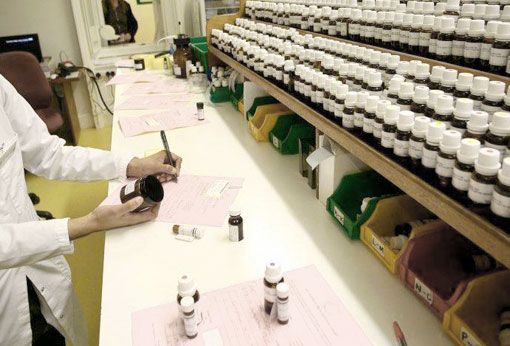New publications
Homeopath
Last reviewed: 03.07.2025

All iLive content is medically reviewed or fact checked to ensure as much factual accuracy as possible.
We have strict sourcing guidelines and only link to reputable media sites, academic research institutions and, whenever possible, medically peer reviewed studies. Note that the numbers in parentheses ([1], [2], etc.) are clickable links to these studies.
If you feel that any of our content is inaccurate, out-of-date, or otherwise questionable, please select it and press Ctrl + Enter.

Treatment with homeopathic preparations is carried out only by a homeopath - a certified doctor who has not only the main clinical specialization, but also additional training in homeopathic therapy methods with a corresponding qualification certificate. It should be taken into account that the longer the homeopath's practice, the more extensive his knowledge and experience should be, and practical skills allow him to solve the most complex problems of patients.
Even before our era, the famous Greek physician Asclepiades said that the best cure for fever is... fever itself.

While conventional symptomatic therapy (allopathy) directs all its efforts to getting rid of the manifestations of the disease, the homeopath strives to activate the internal capabilities and adaptation systems of the body and cure it. In homeopathy, it is believed that a disease is a response of the body to a negative factor, and the symptoms of any disease are a manifestation of the body's fight against the disease and its causes. And this reaction is always individual. It depends on many factors, including heredity, age, constitutional features of the body and its physiological capabilities.
The main postulate of the alternative therapeutic system - homeopathy - is "like cures like". That is, to cure a disease, the patient must be given a substance that causes the same symptoms. Only the doses of this substance must be microscopic.
 [ 1 ]
[ 1 ]
Who is a homeopath and what diseases does he treat?
Homeopathic preparations do not accumulate in the body, do not cause allergies and have virtually no side effects. These therapeutic agents contain various minerals, chemical compounds, metals, medicinal plants, animal products and even ultra-low doses of toxins.
When a pharmacy recommends a homeopathic remedy to a person (thereby hinting at its naturalness and harmlessness), a real homeopath will consider this a profanation and a violation of the basic principles of this therapeutic method.
When should you see a homeopath?
As practice shows, first of all, one should turn to a homeopath in cases when all the possibilities of traditional therapy have been exhausted, and the disease does not retreat. And, as homeopaths themselves say, patients who have lost all hope of recovery often turn to them. Sometimes this visit is too late due to the irreversibility of pathological processes. And then a hopelessly ill person can hear: "Well, why didn't you come to a homeopath earlier, because we could have helped you..."
Since homeopathic medicines do not cause allergies, you should consult a homeopath when it comes to the health of children, pregnant women and people prone to allergic reactions, including to medications. Since homeopathic treatment involves changing the state of health for the better, it is especially advisable to use it to treat children with reduced immunity who often get sick.
What tests should be taken when visiting a homeopath?
Usually, patients do not go to see a homeopath empty-handed, but with either a medical card or an extract from the medical history, as well as the results of clinical tests (blood, urine, biopsy), X-ray data, ultrasound, MRI, etc. And if this is not enough for the doctor, he himself will determine what tests need to be taken when contacting a homeopath.
If a person has not visited a regular medical institution regarding their illness, then it is necessary to take tests, undergo an examination or consult a specialist. Firstly, you yourself will know what you need to be treated for. Secondly, a homeopathic doctor needs clinical data to accurately monitor the course of treatment and the dynamics of the disease.
What diagnostic methods does a homeopath use?
The homeopathic method of therapy differs significantly from the generally accepted allopathic method, and for successful treatment of the patient, the stage of identifying the most accurate list of signs and conditions of the manifestation of the pathology is extremely important. It is the full picture of the patient's symptoms that will allow you to select the right homeopathic remedy.
In addition to the usual examination of the patient, the diagnostic methods used by the homeopath include a detailed clarification of the individual characteristics of the constitution and psychological state of the patient. And here the homeopath will ask the patient about what he was sick with in childhood, what vaccinations he was given, what injuries or operations he suffered, what his parents or children were sick with. The doctor will definitely ask how the person eats and sleeps, how he reacts to the change of seasons and weather conditions, what physical activity he does... Based on all this data, the specialist will conduct a comprehensive analysis of the state of health, identify the specifics of the course of the disease and only then draw up a treatment plan and prescribe the appropriate drug.
What does a homeopath do?
After establishing or clarifying the patient's clinical diagnosis, the homeopathic doctor prescribes treatment and selects the necessary remedy. The effectiveness of treatment directly depends on the correct selection of the drug, which the specialist prescribes taking into account all the characteristics of the body of a particular patient.
In addition, the homeopath monitors the course of treatment at all its stages and, if necessary, makes adjustments to the dosage of drugs, and often resorts to discontinuing some drugs and prescribing others.
What diseases does a homeopath treat?
Homeopathy does not treat diseases that require urgent surgical intervention, as well as acute infectious diseases, mental and venereal diseases, some metabolic pathologies (for example, insulin-dependent diabetes mellitus or thyroid dysfunction - hypothyroidism). Homeopathy is not used as a primary treatment method for oncological diseases.
So, what diseases does a homeopath treat:
- gastrointestinal diseases (gastritis, cholecystitis, pancreatitis, enteritis, colitis, gastric ulcer and duodenal ulcer, intestinal dysbacteriosis, diseases of the pancreas and liver, cholelithiasis, biliary dyskinesia);
- heart disease (heart failure, coronary heart disease, arrhythmia, angina pectoris, cardiac neurosis, hypertension);
- vascular diseases (varicose veins, capillary lesions, endarteritis, atherosclerosis);
- diseases of the spine and joints (osteochondrosis, herniated discs, deforming arthrosis, polyarthritis);
- respiratory diseases (bronchitis, bronchial asthma, chronic pneumonia, pulmonary emphysema);
- ENT diseases (tonsillitis, sinusitis, tracheitis, adenoiditis, rhinitis, hay fever, polyps, otitis);
- skin diseases (allergic dermatitis, eczema, neurodermatitis, psoriasis);
- gynecological diseases (endometriosis, fibroids, uterine myoma, ovarian cysts and dysfunction, thrush, mastopathy and cysts of the mammary glands, infertility);
- urological diseases (urethritis, pyelonephritis, cystitis, prostatitis, prostate adenoma);
- pathologies of the endocrine system (adrenal diseases, autoimmune goiter, age-related hormonal disorders);
- psycho-neurological and polyetiological disorders (vegetative-vascular dystonia, headaches, dizziness, diencephalic syndrome, neuroses);
- any form of allergy;
- childhood diseases (enuresis, diathesis);
- rapid fatigue, chronic fatigue syndrome, insomnia;
- post-traumatic conditions.
Advice from a homeopathic doctor
The founder of homeopathy, Christian Friedrich Samuel Hahnemann, said that “the highest ideal of treatment is the rapid, gentle and final restoration of health or the removal and destruction of disease in its entirety in the shortest, most reliable and safest way.” And today, classical homeopaths adhere to the basic laws formulated by Hahnemann:
- healing occurs in accordance with certain laws inherent in nature;
- healing without these laws is impossible;
- there are no diseases as such, there are only sick people;
- disease is a state of dynamic nature, and the remedy must be the same;
- At each stage of the disease the patient needs only one medicine. If this medicine is not found, he cannot be cured, but he can get temporary relief.
Homeopathic treatment is effective for chronic diseases, and if you contact a specialist in a timely manner, you can be cured of them.
Advice from a homeopathic doctor for those taking homeopathic remedies:
- When undergoing homeopathic treatment, you cannot drink coffee (including instant coffee), or consume products that contain caffeine: dark chocolate, green and strong black tea, and coca-based drinks (Pepsi-Cola, etc.).
- When treating with homeopathy, you cannot use medicinal herbs, especially mint. Mint neutralizes the effect of homeopathic preparations.
- When treating with homeopathy, one should avoid severe stress, mental strain and lack of sleep.
You must admit, these are not such impossible conditions... Especially since a homeopath can really rid you of the disease, and not just its external manifestations and pain.
